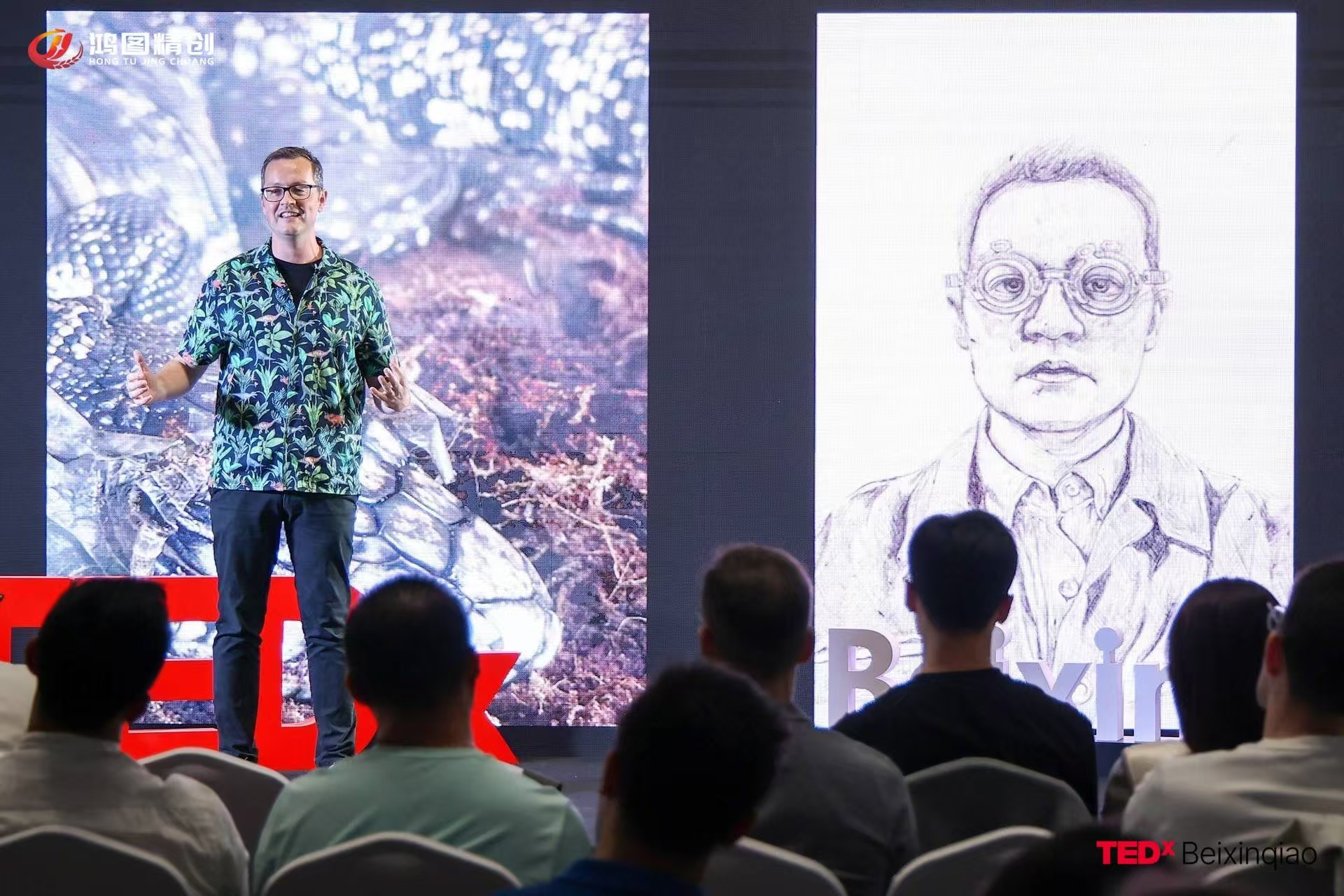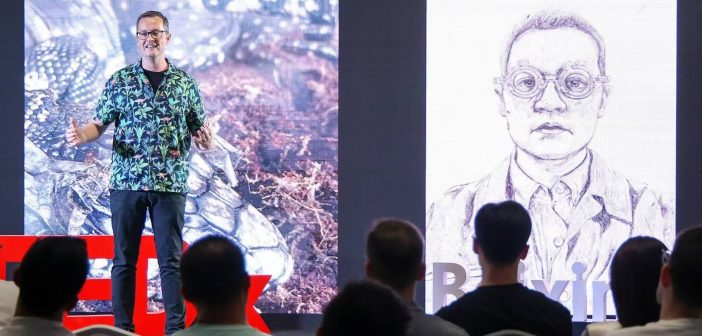We recently had the privilege of coming across an inspiring TEDx talk that left a deep mark on our hearts. Joseph Stewart, a personable speaker and remarkable expat Beijing parent and teacher, shared his life-altering journey with a daughter with special needs. His words were not just a recounting of experiences but a powerful narrative that opened our eyes to the challenges, joys, and profound lessons within this unique family story.
 We were eager to chat with him and delve deeper into the emotions, struggles, and triumphs that he has encountered along the way, and to bring to light the remarkable resilience and love that defines his family’s path.
We were eager to chat with him and delve deeper into the emotions, struggles, and triumphs that he has encountered along the way, and to bring to light the remarkable resilience and love that defines his family’s path.
Please take a moment to introduce yourself and what brought your family to Beijing.
I’m Joseph Stewart. I teach art, and when I have time, [I] make my own illustrations, too. I met my wife, Luo Tao, when we both studied art at The Glasgow School of Art in Scotland. We moved over to Beijing around ten years ago when our older son Danny was one. He has started middle school this year. Rosie was born in our second year in Beijing.
 Please tell us a bit about Rosie.
Please tell us a bit about Rosie.
Rosie is a beautiful and energetic 8-year-old girl. She loves all things active, like hiking, running, and swimming. She loves picture books, especially ones with cute animal characters, and her favorite place to visit in Beijing is Universal Studios. Rosie is also nonverbal and has profound autism, which makes her a vulnerable person with a neuro-disability. We love her so much for who she is while at the same time acknowledging her disability provides significant challenge and stress to her life and to those who support her.
 Where do you work now? Tell us a bit about how your school has been supportive of Rosie’s special needs.
Where do you work now? Tell us a bit about how your school has been supportive of Rosie’s special needs.
I currently work at the International School of Beijing (ISB) and lead the art and media department. I feel very lucky for me and my family to attend this school as it is highly supportive of Rosie’s needs. Many international schools may encourage students to do service work on the weekends to work with children with disabilities, but ISB is unusual in the fact it has a special Life Centered Education unit that supports ten international students with complex needs. Most of these students have other neurotypical students who attend the school, and I know all families are very grateful. The teachers, speech therapists, and support staff in this unit are simply outstanding humans whose vocation is to support and work with vulnerable children. The progress Rosie has made under their guidance is quite extraordinary. Although she is still speaking little, she is learning mathematics, writing, and self-management skills. It took a while to adjust to the high level of support Rosie receives and not having to constantly stress and worry throughout the day as we know she is being looked after so well. I could go on and on about this, but recent highlights are her planting and growing vegetables, attending a running club with other children, and learning kung fu. Perhaps most meaningful is how the school pairs Rosie up with a homeroom class where young children her age look after her and consider her to be a friend. One lovely little girl even bought her pink earmuffs last winter as she recognized Rosie didn’t like the feel of her hat.

During your TEDx talk, you mentioned you were resistant to accepting Rosie’s disability. Why do you think that was?
I guess subconsciously, yes. I would say that we held on to hope for as long as possible that Rosie was just a slow developer. Coming to terms with a severe neuro-disability is very challenging as it isn’t determined physically, and it is something that slowly comes into focus. All parents want the best for their children, and it is simply heartbreaking to look at a 4-year-old girl and give up hope that she will go to college, travel the world, find happiness, etc. I also feel societies make this hard for parents to accept. Most people show kindness and empathy to children with physical disabilities but may judge those with neuro-disabilities to be badly behaved or to have negligent parents. This causes in some ways a fight-or-flight defense in parents, which can slow down the acceptance process. We know how many kind people there are in the world who supported us on this journey, but hurtful words or actions from the less-informed majority can be very hurtful. Plus, the background of a global pandemic made this extra challenging. Through all this, I have thought about just how challenged disadvantaged communities must be in similar situations.

You coined a very interesting term during your talk. What do you mean by being “reptile-skinned”?
Being reptile-skinned is about living with hope, fear, sadness, and joy all at the same time. Often, we are taught to isolate and compartmentalize these strong feelings, but I feel they are all part of an ongoing cycle of growth. Often people, especially males, may be expected to be thick-skinned and toughen up when having a hard time. Being [reptile-skinned] is about learning to accept and feel the sadness you experience in a challenging situation. Don’t ignore it, but feel and process it no matter how hard as this is part of the healing process and letting your new layer of reptile skin push through with greater wisdom and hope. I really feel this mental health metaphor could be very helpful to many people going through different challenges as the visual metaphor means it can be understood by people of different languages.
 Why did you want to share your story? Was it difficult to bring yourself to share your personal life with strangers?
Why did you want to share your story? Was it difficult to bring yourself to share your personal life with strangers?
As soon as I saw that there was going to be a TEDx in Beijing, I knew I wanted to share my story. I was unsure how to go about this as I found it so hard to talk about something emotional and personal without getting overwhelmed. I was motivated by the pain many parents face that isn’t widely known about and felt I could use my educational background as well as previous speaking experience to give [a]voice to others. I was very careful to not assume other parents would experience things in the same way as I did but wanted to share how I felt. As it turns out, many people have felt similar feelings and got in touch. I also think as a teacher it is important to show students how to be honest and open about how you feel. I still feel there is stigma about speaking about mental health, but to be honest, it just felt like the right thing to do to speak up for Rosie.
What do you hope the audience will take away from your talk?
I hope the audience will remember the reptile skin metaphor in my talk, and it could help them if they are also experiencing an ongoing challenge or will in the future. I also hope it can help them understand that parents of children with disabilities live with significant stress and challenges – both everyday aspects and planning for the future.
Do you have a specific goal in terms of changing the audience’s perspective or inspiring them to take action?
I would say the dream would be to somehow find a way to write down these ideas and thoughts in illustration books. Sometimes jargon-heavy language can be hard to understand, and I hope to make digital or physical reproduced texts that can be shared with people for free. I feel the aim isn’t for the talk to get many views but to speak deeply to people who resonate with it. I have already been contacted by parents like me in different parts of the world.
 Is there a supportive group in Beijing?
Is there a supportive group in Beijing?
There are many supportive communities in Beijing. At ISB, some American embassy families introduced us to the Disability Action Group, and Rosie even got to meet the US Ambassador. There are also many companies and organizations supporting children with complex needs, and it is great to connect with the parents of Rosie’s classmates. At the same time, some of the biggest support I personally receive as a parent is being with friends who share my passion for art and long-distance running. Although I don’t like to be away from my family too often, it is necessary to have a breather and focus on other activities with kind and like-minded individuals. I find inspiration in the depth of thought and creative problem-solving with artistic friends and, not surprisingly, resilience, determination, and goal-setting with people I run with.
It was such an inspiring speech. How did you prepare for it?
Well, it was a lot of preparation as I wanted it to go well. The organizers of TEDx arranged for me to work online with a speaker coach in the US, which was the most amazing experience. The first time I met Jess (coach) I am pretty sure I waffled incoherently, and I have no idea how she helped me organize and process my thoughts. Doing a TEDx talk takes commitment, and we would have fortnightly morning meetings at 6am. I probably drafted and redrafted around ten times and received constructive criticism from organizers such as Keith and Sebastian. Sebastian would look at each word with scrutiny to help get the tone right. One of the best bits of advice Keith gave me was to understand the difference between a written and spoken story. What seems natural on a script may seem out of place when it comes out of your mouth. I am very grateful for all the help and feedback, and at the same time would say it is essential you can take on board and respond to constructive criticism when planning a talk.
What do you think makes the TEDx platform special for sharing your ideas?
I think it is so special as once the talk is published, it can be there forever and people can access it in their own time. TEDx will not automatically publish talks and check them carefully, so it is important to understand that feedback is all essentially geared towards having your talk eventually published. I feel very privileged to be able to have my speech recorded with such high-quality visual and audio recording. It is hard not to cringe when you first hear it back, but it’s been lovely to hear the feedback from people around the world who have watched it.
Click on the link below to watch Stewart’s full talk.
https://m.youtube.com/watch?v=DSu2O5twi5A
Images: Joseph Stewart




